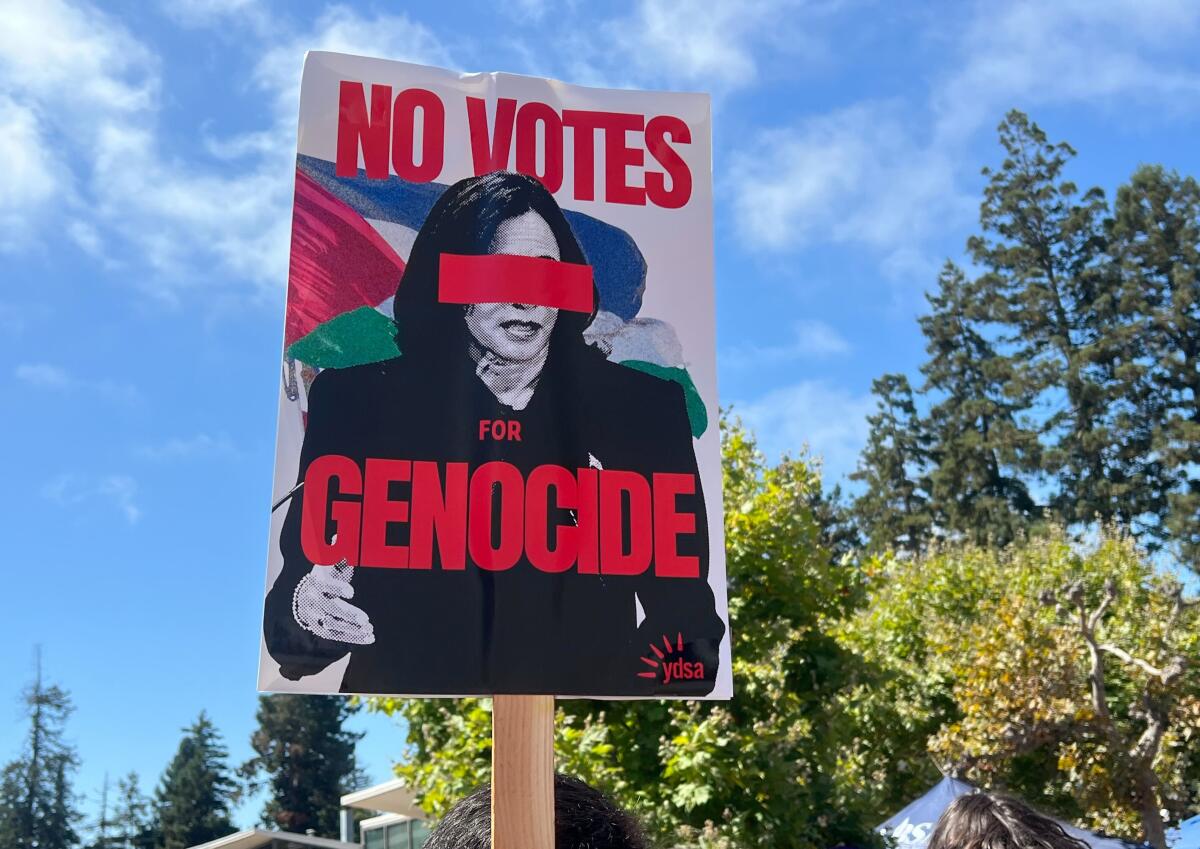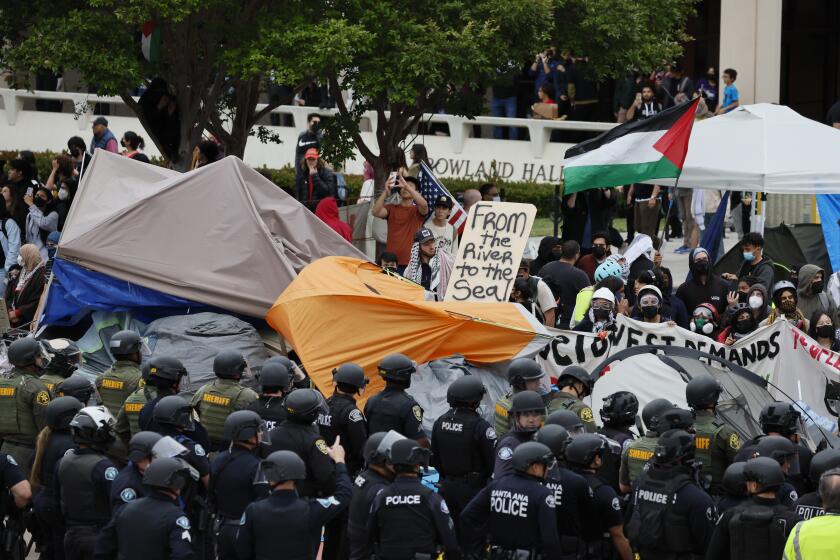Students kick off fall semester with protests that adhere to UC/CSU zero-tolerance bans

- Share via
BERKELEY, Calif. — Students across several Bay Area universities kicked off fall semester Thursday with coordinated pro-Palestinian rallies that were impassioned in tone but adhered to the zero-tolerance regulations that the University of California and California State University systems have vowed to strictly enforce this school year in hopes of preventing the disruptive tactics that roiled campuses much of last spring.
At UC Berkeley, roughly 200 students converged on Sproul Plaza, a central gathering spot that last spring was the site of a sprawling encampment that grew to more than 180 tents at its peak. The protesters did not flout UC’s systemwide rules banning encampments and the blocking of walkways. But they made it clear they intend to keep their opposition to the war in Gaza and concerns about the plight of Palestinians front and center in the new school year.
For 90 minutes, demonstrators waved Palestinian flags and joined in chants accusing Israel of apartheid. Featured speakers spoke out against the violence in Gaza and accused President Biden and Vice President Kamala Harris of genocide for not cutting off military aid to Israel.
Outside the core protest group, most students walking through Sproul Plaza paused only momentarily to take in the spectacle before hurrying on to class.
Across the Bay Bridge, about 100 students at San Francisco State University staged a companion rally at Malcolm X Plaza, near a quad where students erected an encampment for two weeks last spring. They were joined by pro-Palestinian students from UC Santa Barbara, UC Santa Cruz and a handful of other Bay Area campuses.

“We need to come back stronger than last year,” said one student speaker, who identified herself only as Zainab. She spoke from a makeshift stage, standing in front of banners decorated in the colors of the Palestinian flag — black, red, white and green — that read, “There is no future without Palestine.”
“We are going to have marches, people are going to try to shut us down, silence us,” she said. “This will be the first of many rallies this year.”
The reignited protests signal the continued resolve many students feel to take a stance against the war in Gaza, despite threats of disciplinary action under stricter enforcement of policies banning behaviors that spawned campus division, lawsuits and, in some cases, violence last school year.
Earlier this month, UC President Michael V. Drake directed chancellors at all 10 campuses to strictly enforce rules against encampments, blocking access to buildings and walkways and masking used to conceal one’s identity while committing wrongdoing.
UC Berkeley’s new chancellor, Rich Lyons, had said he would honor free speech rights but also ensure those rules were followed.
“There are hundreds of places on the Berkeley campus for students to express their free speech rights,” he told The Times last week. “We are a free speech university. But to intentionally break the rules ... now you’re in the world of civil disobedience and we’re going to think about consequences.”
CSU Chancellor Mildred A. García and 23 CSU campus leaders also have issued a systemwide statement about protests. The university said campuses “must maintain an environment where its work can be conducted without disruption.”
Banned activities include “camping, overnight demonstrations, or overnight loitering” and “unauthorized temporary or permanent structures, walls, barriers, barricades, furniture, or other objects.” Illegal activity includes “vandalism, property damage, trespass, occupation of a building or facility, refusal to disperse in violation of the law” and promoting violence.
The demonstrations at UC Berkeley and San Francisco State stayed within those parameters Thursday. Still, some protesters said they are willing to risk disciplinary action to continue speaking out against what they describe as an international humanitarian crisis.
Yousuf Abubakr, a UC Berkeley graduate student in mechanical engineering, said heart-rending images on social media of the suffering of Palestinian civilians prompted him to join the movement.
“We’re not going to let the UC president and UC regents dictate what we do,” said Abubakr, a Sudan-born Muslim. “We’re not going to be happy until we see the liberation of Palestine. A lot of us are confident in our ability to educate and create change.”
Still, he said, encampments were just a “negotiating tool,” and organizers will likely move on to other tactics as they assess what is both effective and safe.
The University of California will enforce rules against encampments, blocking pathways and wearing some face masks as students begin returning to campus after a protest-filled spring, the system president told the UC community.
The demonstrations last school year represented the largest student activist movement since the Vietnam War. Pro-Palestinian supporters erected tent cities on multiple California campuses, and in some cases took over buildings and sprayed graffiti to protest Israel’s sustained military assault on Gaza.
The war broke out Oct. 7, when Hamas militants attacked and killed about 1,200 people in southern Israel and took an estimated 250 Israelis and foreign nationals hostage. Israel’s retaliatory attacks have killed more than 40,000 Palestinians, according to the Gaza Health Ministry.
UC leaders in April rejected a key demand that has driven the student protests: a call for UC to divest from companies that do business with Israel.
At UC Berkeley, demonstrators removed tents on Sproul Plaza at the end of the spring semester after reaching an agreement with then-Chancellor Carol Christ. Under the agreement, Berkeley rejected calls to directly target Israel through divestment or academic boycotts, but promised to review complaints about discrimination against Palestinians and other groups in academic partnerships such as exchange programs.
CSU leaders also say they have no plans to target Israel for divestment.
But in reaching an agreement with protesters in May to dismantle their encampment, San Francisco State President Lynn Mahoney said she would host talks to discuss changing the investments of the SF State Foundation, the university’s fundraising arm.
The foundation said last week that it had come up with a “region-neutral plan” — one that would not single out Israel — to “remove investment in any company whose revenues come from weapons manufacturing.”
San Francisco State can “exemplify how student activism can result in positive institutional change,” Jeff Jackanicz, the foundation’s president, said in a campus-wide letter. Jackanicz was not available for comment Thursday about which companies were affected by the policy change.
James Aziz, a student who took part in the talks, said four corporations were on the list: Lockheed Martin, the Italian defense company Leonardo, Palantir Technologies and Caterpillar.
“We do not know how much money was in those companies,” Aziz said. “But it’s not about how much money; it’s about setting a precedent and having other institutions follow.”
More to Read
Sign up for Essential California
The most important California stories and recommendations in your inbox every morning.
You may occasionally receive promotional content from the Los Angeles Times.














